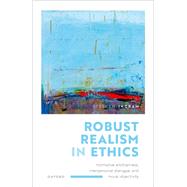Robust Realism in Ethics Normative Arbitrariness, Interpersonal Dialogue, and Moral Objectivity
, by Ingram, Stephen- ISBN: 9780198886488 | 0198886489
- Cover: Hardcover
- Copyright: 10/27/2023
Stephen Ingram defends a robustly realistic metaethical theory, based on the concept of normative arbitrariness, of which he provides the first in-depth analysis. He argues that, in order to capture the normative non-arbitrariness of moral choice, we must commit to the existence of robustly stance-independent, categorical, irreducibly normative, non-natural moral facts. Specifically, he identifies five ways in which a metaethical theory might fail to capture the non-arbitrariness of moral choice. The first involves claims about the bruteness of moral attitudes or facts. The second involves claims about the privileging of some attitudes over others. The third involves the claim that some metaethical theories leave a normative deficit. The fourth involves a claim about our ownership over moral reality. And the fifth involves the claim that certain metaethical theories introduce a destabilising contingency into the moral domain. Ingram argues that robust realism is the theory that is best placed to avoid all five of these arbitrariness charges. He then goes on to show that, by exploring the nature of interpersonal moral dialogue, robust realists can defend epistemological and meta-semantic theories that are friendly to their view. Specifically, he defends a dualistic form of moral intuitionism on which some moral beliefs are justified on the basis of a priori intuitions, whilst others are justified on the basis of a posteriori moral experiences, and provides a theory of 'moral mental files' to explain how moral terms and concepts are able to refer to robust moral facts.







